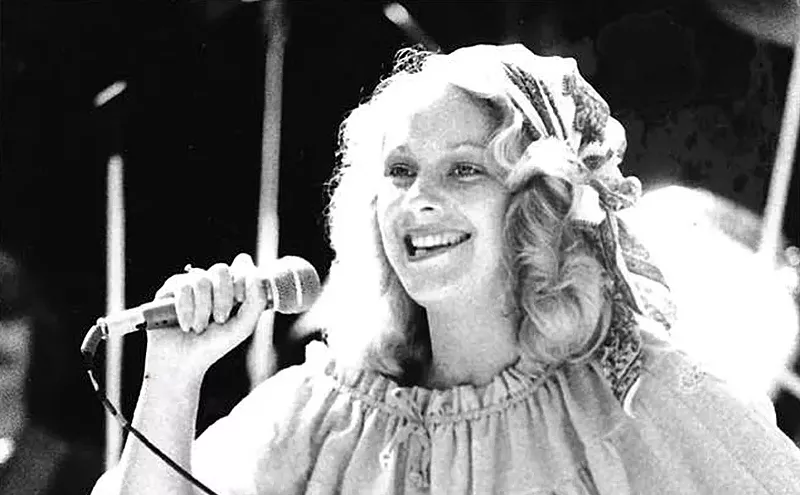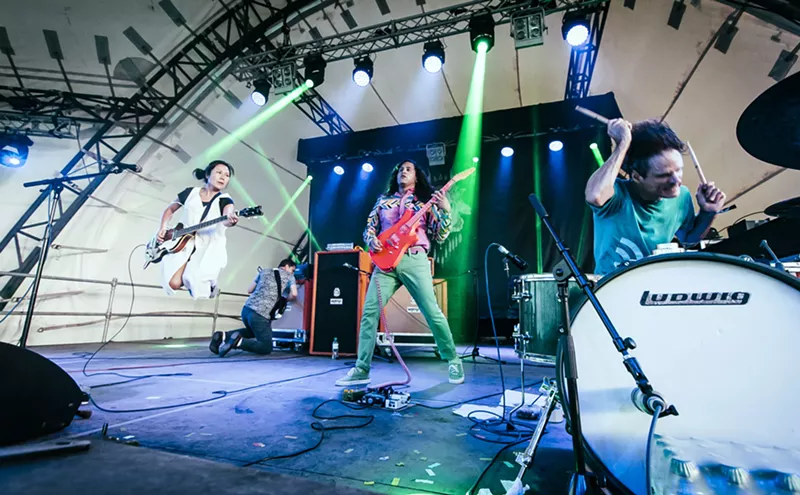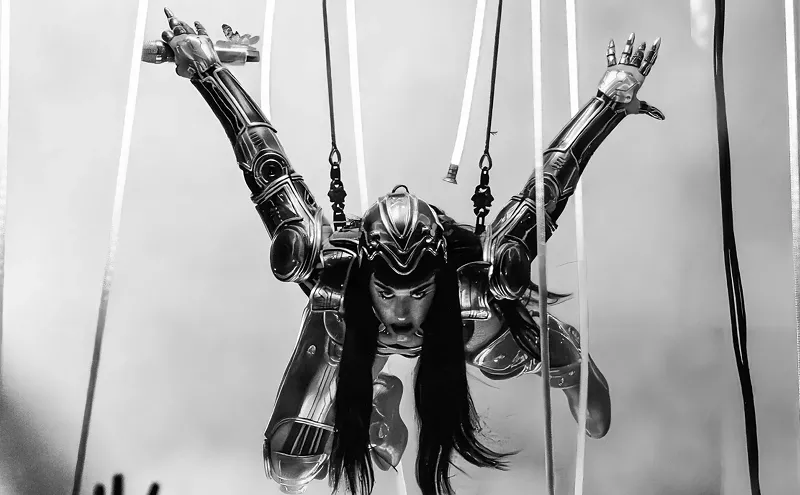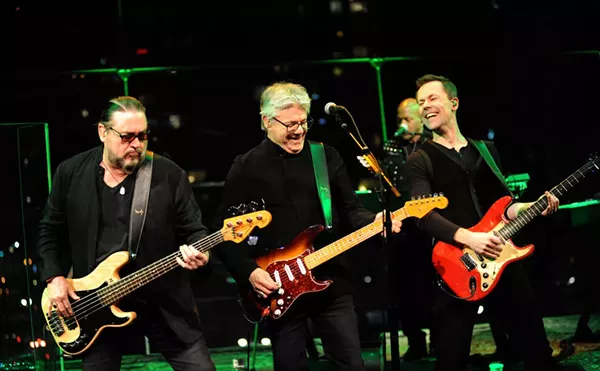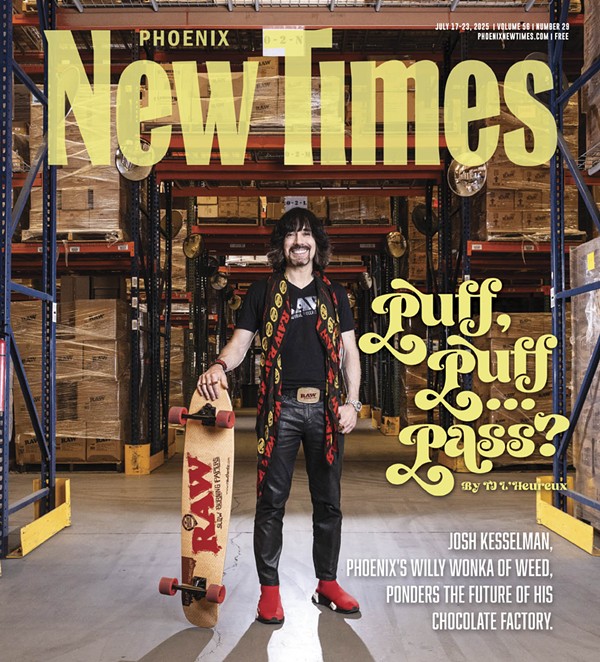We Got Power, the fanzine, grew out of a desire to document the Reagan-era '80s hardcore punk scene as it was taking off in Southern California. Amy Young, the drummer of the now-defunct She*Riffs and of the garage-pop band French Girls (and a sometimes-New-Times contributor), brought the We Got Power exhibit down to Phoenix via Perihelion Arts and Pravus gallery. She wanted to connect the local music scene's history to the broader hardcore punk rock history Dave Markey and Jordan Schwartz had documented.
The Trunk Space is hosting the Phoenix component to the exhibition, which is currently showing flyers, photographs, and other ephemera of the '80s; as First Friday hours close, they are hosting a show with local bands Father Figures, JJCNV, French Girls, and Scorpion vs. Tarantula. Up on the Sun talked to her about nostalgia in punk rock, zines, and the importance of documenting musical history for younger generations.
Up on the Sun: How did you get connected with the project? Amy Young: My partner, Doug, and I opened Perihelion Arts back in 2002. We had a space for years on Grand Ave. before moving to Roosevelt Row, and then we also co-own Pravis Gallery, which is across the street. Now we don't have a physical space, but we are doing about one or two shows a year using different galleries. We both really like music, so we tried to have that in our program--regular exhibitions that involved music that we like, which is a lot of subcultural stuff like punk rock, grunge, and similar type of alternative music.
One of our first shows that we did back in 2002, 2003 was an exhibition of flyers from old Phoenix punk rock shows. We got people who played in old bands in town to pull stuff out of their collections--all the way back to the '80s, and even maybe the late '70s. That was really cool.
We've done shows with Ruby Ray, who's a photographer from San Francisco, who chronicled the early days of punk rock in California. We did an exhibit with Lydia Lunch in 2005, 2006; we always try to keep music that we are interested in somehow in our exhibit programming. A friend of ours who we've done shows with, the photographer, Dave Nass, is friends with Dave and Jordan, who made We Got Power. Dave has been in some bands in L.A. over the years, and they just did an exhibit with this book at Track 16 in L.A.
So they were talking about touring, and we connected over the possibility of doing a show in Phoenix. We hooked up and decided to do a show. Kimber Lanning, who owns Modified Arts, has a guest curator program, and we had talked about doing something there, so this was a really good fit. I also try to work with the Trunk Space as much as I can, and will be doing maybe about four shows there during the year. So we decided we would do the main exhibit for the We Got Power book with photographs from the book at Modified, and then we'd do a local component at Trunk Space that would feature photographs, zines, and other cultural artifacts prevalent in 80's Phoenix music.
How did the Phoenix component to the exhibition come together? How did you decide what to keep in or leave out? We knew that Dave and Jordan's book, We Got Power, was a chronicle of the '80s punk rock and hardcore scene from California, so we wanted to do a similar type of show. We got involved with Arthur Shane, who's been in the scene for years and years, and has worked on zines and documenting things that have been going on in the music scene. Joseph Cultice was taking lots of photos during that time, so we invited him to showcase photos and materials from that time.
Arthur is bringing zines and other ephemera from that time, while Joseph will show a full selection of photographs that feature bands from the '80s Phoenix punk rock scene.
So who's playing on Friday night at the Trunk Space? The show is on Friday night after First Friday hours close.
The first two are pretty popular bands from around town. Scorpion vs. Tarantula--they're really great, super furious, punk rock and rollers; their show is really incredible to watch. They have a really dynamic front woman. It's a powerful show every time. You never know what she's going to do. If she was here right now [at the coffee shop where we met up], she'd be singing or walking across this bar, climbing over you.
Father Figures is three guys, Michael, Cornelius, and Tom, who have all been in a variety of bands since the '80s. They're also kind of a little Phoenix supergroup.
Did you pick those bands because you thought they fit the style and attitude represented in the book? I thought everybody fit the style and the attitude. They're all also big fans of this type of musical history, so everybody involved is excited about this book. A lot of them are fans of Dave Markey's films; they're excited to see his film, My Career as a Jerk, play at Filmbar. Father Figures have a lot of history in the Phoenix music scene, so I thought it would be a nice group to pair together.
You mentioned earlier that you like to connect with the Trunk Space. I thought was significant that you chose to curate the Phoenix component there because the Trunk Space is coming up on its 10th anniversary. First of all, we love them. Great people and they are really close friends of ours. We might have had our gallery open before the Trunk Space opened, but we were on that corner of Grand, on the opposite corner where they are now, where it is now Kooky Krafts. We were in that space for years, so we were neighbors. We grew together and worked together. We always found ways to work together, and I believe 100 percent in what they do.
They aren't afraid to take a chance. They don't have tunnel vision. They're open to music of all kinds of different styles, they do amazing things for local bands, and they've brought in things that are touring from out of town that follow in the mission of building events based on things we are all really passionate about. Whether it's something people know about or don't, they are excited to bring it and turn people on to it. We're always happy to work with them in any capacity.
It's the same thing with Modified Arts, even though they've stopped hosting shows. Kimber Lanning still supports local, national, and international music--whether it's having events like this or at the store.
The exhibit includes bands that are now considered to be legendary, such as Black Flag or Circle Jerks, but it also includes lesser-known bands who are now being introduced via this exhibit. How important is it to reprint and reissue work that is hard to find when most people are unaware it even exists? That's part of the reason to have this national exhibit: You get to see some of these bands that do have this legendary status, or just because they were where they were at the time. They do have this much bigger, broader history we wanted to have included with the local component, because there is such a rich music scene here, and there are so many new people coming here all the time.
You see 14, 15, 16 year old kids coming to places like the Trunk Space and just getting into music, and they can start seeing the history--that's how you find out about what you get into. You bring your notepad and you start writing this down. You might have never heard of a certain band, but you want to go back and see if you can find a record. Now with the internet, there's everything, there's files everywhere, so you can just go home and search it.
I'm not going to say how old I am, but i've been seeing bands for a long time, and pre-internet we found out about things from somebody's sibling's record that you listened to and there was an address to write to on the back, or the back of books, or Maximumrocknroll. You had to write away for things, but you still found information. So now it's the same thing; you can have a show that focuses on this part of Phoenix history that people might not know about.
We live here and know about it, but we can't assume that other people--or everyone--does.
It's important to showcase some things from the past, but then also, I'm currently playing music, and I like to think about how that's going to look in the future too. It sorta seems like a big showcase of the past, but it's [also] about now and future generations, and how the music grows.
Would you consider this exhibit to be nostalgic for the past, or more of a celebration of the past? Both my partner and I were seeing bands as far back as the '80s, so we definitely appreciate the nostalgia of discovering those bands for the first time, or seeing them live. Some people are going to remember that time as that time in their life that was big and important, and then they didn't really do anything musically or listen to anything different from that.
For us, it's a lot of things. We love the music, art and culture of that time. That was a big period of excitement and discovery, and we didn't use technology to find everything. This book reflects L.A., but there are things happening in a similar fashion in every different region. I was in the Midwest, and we had an amazing music scene there; my partner grew up in Orange County, so he got to see a lot of these bands firsthand.
It was a lifestyle for a lot of people. They really experienced that in California. There was an aggression that came with a lot of those shows. A lot of it was a reaction to channel those frustrations about things that were going on in the world. Politically, it was the Reagan era, and that inspired a lot of punk rock bands to be bands and write songs.
There was a real aggression, and it probably was scary to a lot of people. Authority figures really couldn't understand that, so rather than understanding it, it created a reaction. There was always that constant battle with attention and rightfully so. Back in the day, you could get hurt for just walking around looking weird; that still happens to this day, but people also weren't used to seeing popular adaptions of punk rock culture on TV shows. Authority figures seemed to feel pretty comfortable back then joining in on that mentality; there were a lot of shitty cops who participated in that behavior. Now we have Sheriff Joe, and that's just as bad. There's a reason to have bands with things to write about politically.
WE GOT POWER: A photography exhibition based on the book We Got Power! -Hardcore Punk Scenes from 1980s Southern California by David Markey and Jordan Schwartz - is currently on exhibit at Modified Arts. Dave Markey and Jordan Schwartz will be present from 1-3 PM on Saturday, October 5th to sign books.
Phoenix Got Power, Too: An exhibit of local music-oriented photos from the 80s & 90s is currently showing at the Trunk Space. Starting at 9 PM on October 4, they will host a show featuring French Girls, Father Figures, JJCNV and Scorpion vs Tarantula.
Filmbar will be screening "My Career as a Jerk," and "(This Is Known As) The Blues Scale," on October 5th. Dave Markey will be present to sign books.
Top 40 Songs with Arizona in the Title 9 Tips for Using A Fake ID To Get Into A Show Here's How Not to Approach a Journalist on Facebook The 30 Most Disturbing Songs of All Time
Like Up on the Sun on Facebook or follow us on Twitter for the latest local music news and conversation.



